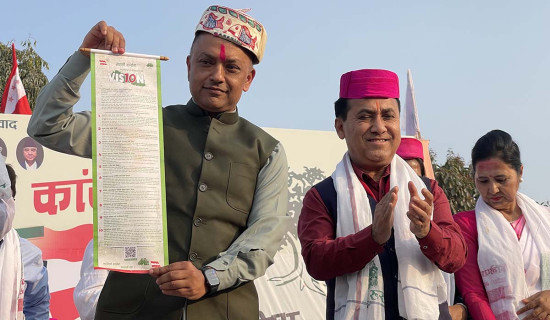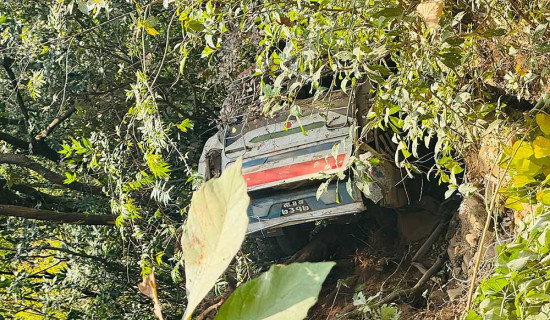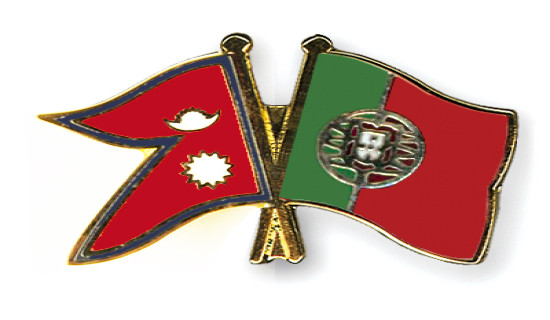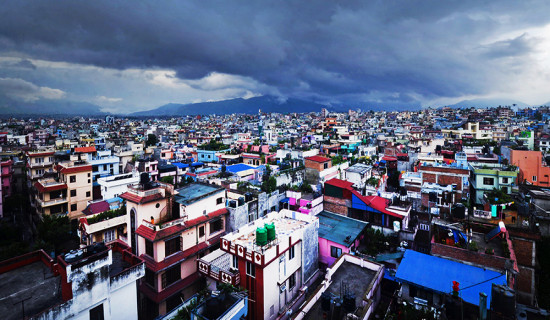- Thursday, 19 February 2026
Civic Loyalty Key To National Sovereignty
A state based on civic loyalty of its people is the robust one. Leaders of many states aspire to realise this ideal resource for political progress and make best use of self-determination for national sovereignty. In a varied society like Nepal with many shades and wills of people expressed in the public sphere, culture and politics, creation of a shared frame of civic order can spur a feeling of collective public trust.
Political maturity abjures one blaming the other for the causes of their misery, marginality and denial from the public goods. Civic loyalty is based on citizenship equality and fundamental rights. It is the source of their opportunities.
It stands tall above their pre-political tribal affinity to primordial units - gender, age, tribe, ethnicity, race, region, religion, etc. But this affection is less disposed to vault state-centric order that balances the state and society through a cultural process of Nepalisation. Civic loyalty is a fundamental part of modern political lives. Primordial view is not the outgrowth of warring instinct of the human psyche.
It only offers a variety of views requiring Nepali leaders to synthesise them into a national vision so that they do not melt into sectarianism. Nepalis’ virtuous belonging to their state is defined by their duties where they sacrifice part of their liberty for security and governance.
Shift
Nepal's constitution has shifted the neo-liberal Nepali state to the egalitarian, redistributive welfare state as per the aspiration of people. Ironically, opportunities for people count on their connection, veneration and loyalty to top party leaders, not laws of the land and affiliation to political parties. Like a spoil system, most chief posts are distributed among their clients. Any criticism of leaders causes the denial of their chance for mobility in the party rank. It indicates that modern Nepali transition to rational politics is a sluggish process. This practice does not shore up a modern welfare state where positions are based on qualification and competency.
The traits of personalised, bureaucratic administration, taxation, national conscription, patronage and cronyism are signs of traditional polity based on patrimonial authority. Modern democracy flourishes in the deliberative practices, lawful procedures and apt use of state revenue. In a patrimonial system, social trust is defined by the atavistic forces of kinship, lineage, village origin, marriage and patron-client relationship, not a common nationality though this relationship fulfils multiple needs of both sides in the political process.
Patrimonial polity opens a chasm between what leaders do and what matters of public interests. The idea of rational progress emerges only from impersonal citizens of impersonal laws of the state. In Nepal personal bonds for party set up and hierarchy serve the essential aspect of Nepali politics. There are certain conditions to strengthen civic loyalty for a strong Nepali state capable of achieving governance goals and winning the hearts and minds of people.
State-Society Interface: In Nepal, the boundaries between the sovereign state, polity, government and political parties are slim. The ties between the state and its sovereign people are feeble while those among non-sovereign entities are mutually gainful. Many selfish private groups act autonomous of the public interests thus rendering both Nepali state and its society’s imperatives hazy.
The weakening of the vital bits of the bureaucracy and political leaders’ unsafe and insecure electoral prospects prompt them to collude, polarise and resort to syndicate thus adding acidity to flux. The Nepali state does not have monopoly on power to execute impersonal constitution in the entire society, abolish impunity, corruption and abuse of rights and harness social capital for national integration.
Special interest groups have permeated vital organs of the state and polity and cut their integrity, competency, legitimacy and performance. The critical mass of civil society, intellectuals and social power is too frail to counterbalance the power of political parties and corporatist groups and finds impossibility to transform electoral legitimacy into substantive one. Strengthening of parliamentary process and making political power morally accountable to ordinary Nepalis require sound state-society interface.
Citizenship Autonomy: Nepal's democracy is based on popular sovereignty, civil liberties, competitive and fair election, autonomous judiciary, free press and people’s participation. In practice, however, ordinary Nepalis are dependent on their leaders for their security, opportunity, public goods and services like in a patrimonial system. Similarly, the logic of economic power undercuts their autonomy in policy choice as most of them are dictated by necessity, poverty and lust for short-term benefits from electoral participation than long-term idea of selecting the best leaders.
As a result, un-socialised in democratic culture, many Nepali leaders view themselves as givers, and people are takers, not sovereign citizens of moral worth capable of articulating their demands and reaping optimal dividends. They do not question their leaders for forgetting the old national virtue of economic thrift. For them people’s consent is taken for granted for their participation, mobilisation or power show. Success of leaders is defined by effectiveness in winning power rather than following the procedures and promoting sustainable development.
These days attentive Nepalis increasingly exercise their autonomy in cultural and political life. The success of their spontaneous revolt to preserve Guthi land from the regime control and defiance of party discipline to vote independent candidates lurk a sign of their increased civic competence. The growth of social media has added their power to visualise self, express opinion and build networks beyond kinship ties. The web of communication has also made certain aspects of modernity workable. This is gradually shifting the logic of old politics of domination and divide- and- rule to the logic of consent.
Overcoming Marginality: A collective sense of marginality and inequality in Nepal among the people of poor social strata is now finding breathing space through the critical media and the writings of sensitive intellectuals enabling them to become aware of their special rights provided by the constitution. Several groups come to the nation’s heartland, Kathmandu, to claim their rights and privileges to keep life to a manageable scale. The protests launched by Rautes, Badis and other underprivileged communities, and sugarcane peasants helped to overcome their position of marginality through justice and bridge the development gaps.
The struggle of labour, women, Dalits and minorities for the equal distribution of opportunities affirms the constitutional imperative of the welfare state. Civic attachments of these groups have broadened their political horizon and improved their ownership in the Nepali state as they pull a balance between corrective and redistributive justice.
Building Common Bonds: The policy of social inclusion adopted by Nepali constitution has built awareness among the party elites of their associative obligations to uplift the left out sections of society and increase their commitments to their empowerment. It is vital to beat alienation and boost participation in not only political parties but also in the state, public institutions, business, civil society, community, elections and cooperatives.
But, the formation of sister organisations of political parties on the basis of pre-modern solidarity and its constitutional articulation can hardly achieve civic dividends vital to hone civic loyalty for Nepali state. These organisations have fostered their own communication style based on the essence of social differentiation, not national integration. In the wake of the earthquake people pinned hope on the state and demanded reconstruction and relief aid, not from political parties, civil society, business and donors.
Civic affinity: A sense of common civic identity and shared beliefs helps overcome pre-political connection and involvement in a common democratic nation-building project. Most of the national–scale political movements of Nepal have common political orientation of democracy, civil liberties, rule of law, press freedom, autonomous judiciary, human rights, social justice and peace. The geopolitical circumstances too demand to mobilise centripetal forces of society for a cohesive state. Internal bonds of Nepali identity and trust across the political diversity is essential for collective action.
Shared affinity
Shared national affinity makes conflict resolution easier and more effective and thwarts geopolitical infiltration to create political proxies for spoiler tactics. There are trends in Nepal fostering the politics of difference, not unity, separateness, not public and national interests. It is threatening to democracy, modernity and the realisation of liberal order of law-based freedom. Political choices must be sought by Nepali leaders on the basis of normative constraint of the national context rather than joining the missteps of geopolitics that honours neither diplomatic code nor rule.
Freedom to decide one’s own life is a worthy goal within a sovereign civic state. The unsatisfied material, moral and psychological needs for justice propel Nepalis to demand from the state. But they must have the feeling for each other’s concern as co-national and hone the collective benefits of co-nationality of diverse populations.
This entails them to overcome their primordial loyalty and build a broad based civic participation in the public sphere and institutions of governance including Nepali state. A liberal political culture of democracy can contribute to the creation of a welfare state if civic loyalty to the state can mark an emancipatory break from illiberal elements of feudalism, patrimonialism, tribalism and authoritarian elements and realise the vision of the quality of life of Nepalis.
(Former Reader at the Department of Political Science, TU, Dahal writes on political and social issues.)









-original-thumb.jpg)
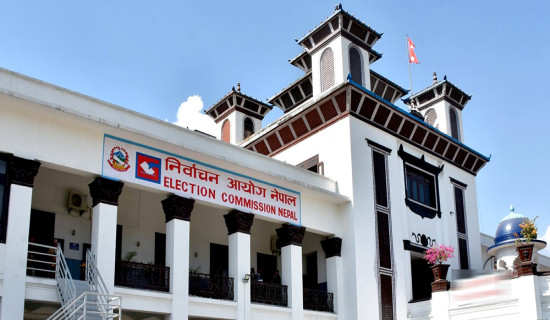
-original-thumb.jpg)

